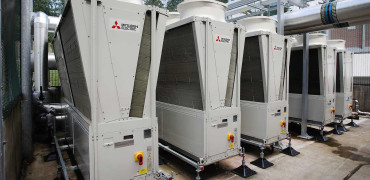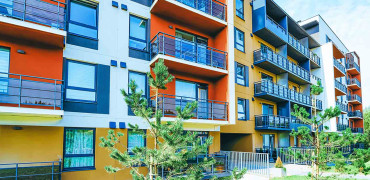There was a time when renewable technologies in buildings were unusual requests from clients with high-profile sustainability goals that they were willing to pay for to achieve in their buildings.
Now it’s a very different story!
Today, construction projects are more likely than not to include low-carbon, high efficiency and renewable solutions. The main drivers behind this shift have been tougher regulations and targets on carbon emissions and energy use in the built environment. The result is that new build and retrofit projects must reduce energy use and cut on-site fossil fuel systems.
For example, in commercial property, the Minimum Energy Efficiency Standards (MEES) are setting the pace, with buildings facing obsolescence if they don’t meet minimum E ratings for their EPCs – and with a proposed rise to a minimum of C and then B on the horizon for 2030.
Investments in low-carbon and renewable technologies must still prove their worth financially
M&E is at the ‘coal face’
M&E contractors are often at the front end of delivering these changes on projects, because the HVAC systems they specify can deliver significant energy and carbon savings in new and existing buildings.
In fact, retrofitting buildings with technologies such as heat pumps, low-GWP air conditioning systems or heat recovery ventilation is now a major element of work for the industry.
In the recent BESA Top 30 UK M&E Contractors 2024 report, Gokhan Hassan, managing director of GHCS/GH Engage notes that building services has a critical role to play in improving the existing building stock: “This is where building services can show an immediate return on investment and demonstrate the benefits to the client of working directly with an MEP specialist.”
His point about return on investment for low-carbon technologies is important. Although environmental considerations are increasingly important, investments in low-carbon and renewable technologies must still prove their worth financially.
Environmental credentials draw higher rents
For buildings facing the risk of becoming stranded assets, losing rental or sale value in the face of low EPCs for example, the return is clear: continued viability as an asset.
However, it’s also increasingly clear that new buildings with environmental credentials are drawing in higher rents. A recent report from Reuters notes that: “Top London-focused landlords are betting on environmentally compliant office spaces at prime locations that offer higher rents as tenants become more selective in their real estate investments.”
HVAC systems can also deliver immediate financial returns in the form of reduced energy use. Modern efficient air conditioning systems can deliver an immediate uplift in efficiency as well as long-term savings. This is particularly important as building owners face increasingly volatile energy pricing.
Maintaining your credentials
Further long-term savings are likely around maintenance. Modern systems provide greater peace of mind with fewer unexpected outages. In addition, when switching to equipment with new, low-GWP refrigerants, building owners and FM teams can have the confidence that they won’t be paying over the odds for refrigerants that are being phased down by the F Gas regulations.
Of course, there is another aspect of return on investment to consider. New technologies require new skills, and that means that our M&E contractors must invest in training and education. The industry has gone through some very challenging times recently, so training funds are tight. Everyone in the industry must consider the ROI of learning new skills.
At Mitsubishi Electric, we work closely with our contractor partners to help them develop the skills to deliver low-carbon solutions. Our training programme provides them with the know-how and confidence to work with their clients and provide advice on operation and maintenance.
We’ve also launched our Committed Carbon Reduction Partners scheme to help contractors engage fully with the drive for net zero carbon in the built environment – and to provide credentials when tendering for work.
We believe that there is a huge and growing demand for HVAC systems that deliver efficiency, reduced carbon emissions and excellent performance – that’s why we have invested as a manufacturer in developing them. But we know that investing in the skills to design and install these systems is equally important.
Dave Archer is Business Manager - Influenced Sales




